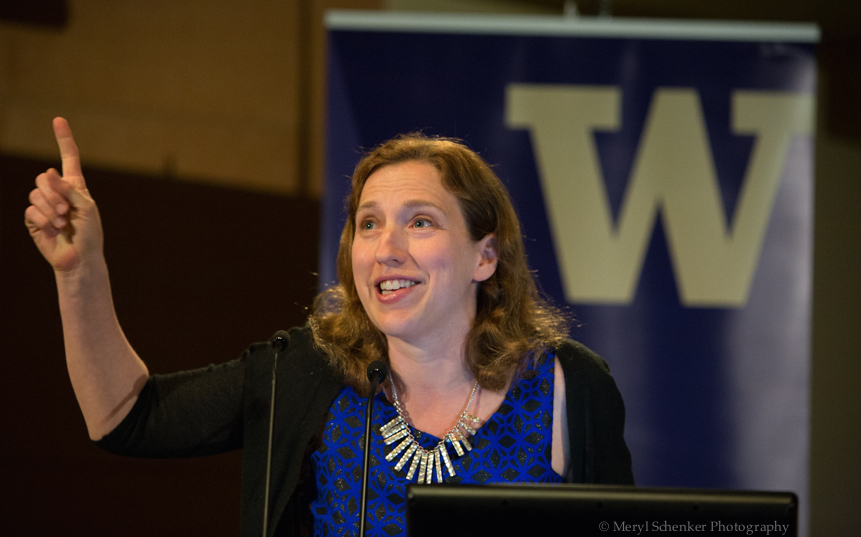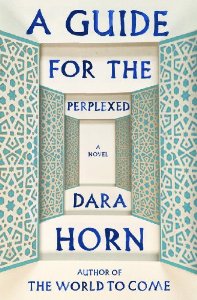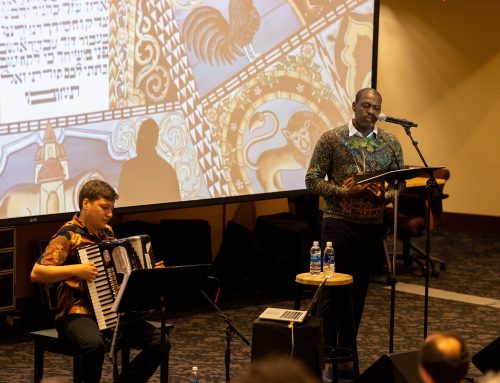
Dara Horn spoke about S.Y. Agnon, Hebrew in America, and reading herself in translation at her Stroum Lecture. University of Washington, May 23rd, 2016. Photo by Meryl Schenker.
By Denise Grollmus
Editor’s note: Novelist and scholar Dara Horn visited the University of Washington last month for the Stroum Lectures on “Hebrew and the Creative Imagination.” Before her trip, Horn spoke with Denise Grollmus, aa PhD student in the Department of English and a former Jewish Studies Graduate Fellow. We are pleased to share excerpts from their conversation below. A version of this interview appears in the June-July issue of Jewish in Seattle magazine.
Denise Grollmus: What is your connection to Hebrew?
Dara Horn: I didn’t grow up speaking Hebrew, and I never lived in Israel. I visited a few summers, but I don’t have parents or relatives there. It wasn’t something that was in my life as a spoken language, and it was not part of my life in way it is for contemporary Israelis, but it was part of my life in the way that it has been for thousands of years — not as spoken language, but as spiritual language. I think there is this continuity in studying Hebrew as a child and coming to learn it better as an adult. I have this sort of long view of Hebrew. It’s different from the way I feel about Yiddish. It came from being a Torah reader — something that was powerful and moving to me in a religious way — as in “this is something that transcends my life and the relatives I have met in my family; this is something that has been drawn from thousands of years ago to me.” Where it was an afterschool activity when I was a child going to Hebrew school, I later became aware of this greater sort of emotional and cosmic significance of this language.
DG: What are the biggest differences, to you, between English-language and Hebrew-language literature?
 DH: My novel A Guide for the Perplexed came out in Hebrew a month ago. I went through that translation myself, and what was amazing to me was the experience of reading my book in Hebrew. I had this strange feeling that I was reading the original, like, “This is what I wanted to say.” For example, for a close reading of the ba’al teshuva (newly religious), I needed a paragraph in English. It takes a lot more space and is distracting, when the point of the passage was not to walk you through the anthropology. It’s burdensome to have to explain it. Then you have two words — whole concepts I have to explain, that I don’t have to explain in Hebrew. It’s more of a function of Hebrew grammar. The translation was 100 pages shorter than the English. A sentence in English can become a word in Hebrew. It’s very eerie to read through and see “this is what I meant.”
DH: My novel A Guide for the Perplexed came out in Hebrew a month ago. I went through that translation myself, and what was amazing to me was the experience of reading my book in Hebrew. I had this strange feeling that I was reading the original, like, “This is what I wanted to say.” For example, for a close reading of the ba’al teshuva (newly religious), I needed a paragraph in English. It takes a lot more space and is distracting, when the point of the passage was not to walk you through the anthropology. It’s burdensome to have to explain it. Then you have two words — whole concepts I have to explain, that I don’t have to explain in Hebrew. It’s more of a function of Hebrew grammar. The translation was 100 pages shorter than the English. A sentence in English can become a word in Hebrew. It’s very eerie to read through and see “this is what I meant.”
DG: What is most intriguing to you about the Hebrew language?
DH: If you look at the history of the development of modern Hebrew as a language, it didn’t even have verb tenses for some things, like the past continuous tense. That was invented by Hebrew novelists, because it didn’t exist. That is just amazing. In another example, in a novel by [David] Fogel from 1929, Robert Alter points out that in his private diaries he uses phrase “my I,” which means “myself” — a religious term for a soul. But that’s not what it means. He invented this expression. There are cultural reasons why these things didn’t exist, and you could do this analysis of why these things didn’t exist. What’s interesting is that you appreciate the layers of a language more when it’s not your native language. All of these languages have archaeologies of belief built into them, and we don’t think about it. When you say “for better or worse,” you’re not thinking about how you are quoting the Anglican marriage ceremony.
As a non-native speaker, I’m listening vertically, through time and through layers, in a way that I wouldn’t be able to do in my native language, in English.
DG: You are also a scholar of Yiddish. Does this factor into your life the same way Hebrew does?
DH: I have four children, and a couple of my works deal with Yiddish. People ask, “Why wouldn’t you teach your children Yiddish?” I teach them Hebrew, because that is where we are now. I want them to participate in the tradition, I want them to be able to feel comfortable in Israel, and those are not goals accomplished by teaching them Yiddish. For me, Yiddish was never a living language, never connected to Grandma. For me, it was an academic study, a way of understanding the Yiddish past. For some it is a living language, but not for me or the way that I raise my children. I do want and need them to experience Hebrew.

![Muestros Artistas [Our Artists]: Bringing Sephardic Art and Community Together at the UW](https://jewishstudies.washington.edu/wp-content/uploads/2023/08/UWJS_Muestros-Artistas-cropped-500x383.jpg)





Leave A Comment